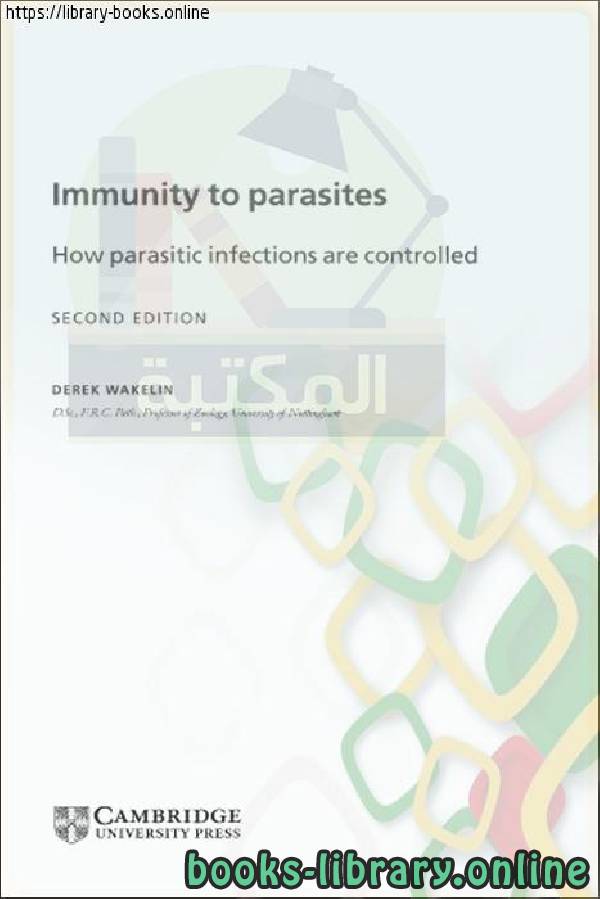📘 ❞ Immunity to Parasites ❝ كتاب ــ كاتب غير معروف اصدار 2006
Biology Books - 📖 كتاب ❞ Immunity to Parasites ❝ ــ كاتب غير معروف 📖
█ _ كاتب غير معروف 2006 حصريا كتاب ❞ Immunity to Parasites ❝ 2025 Parasites: About the book: Parasites such as protozoa or helminths currently account for greater morbidity and mortality than any other class of infectious organisms, particularly in developing countries The structural antigenic diversity pathogenic parasites is reflected heterogeneity adaptive immune responses that they elicit Protozoa live within host cells are destroyed by cell mediated immunity, whereas eliminated IgE antibody eosinophil killing well leukocytes principal innate response phagocytosis, but many these resistant phagocytic may even replicate macrophages Phagocytes also attack helminthic secrete microbicidal substances kill organisms too large be phagocytosed Some activate alternative pathway complement defense mechanism against survive (e g Leishmania spp , Toxoplasma gondii) macrophage activation TH1 derived cytokines inside various lyse stimulate specific cytotoxic T lymphocytes (CTL) Plasmodium ) Defense infections TH2 cells, which results production antibodies eosinophils mast combined actions lead expulsion destruction Most parasitic chronic because weak immunity ability evade resist elimination system varying their antigens during residence vertebrate hosts, acquiring resistance effector mechanisms, masking shedding surface Biology Books مجاناً PDF اونلاين Biologically Biology a natural science concerned with study life, its forms function, how interact each surrounding environment word biology Greek made up two words: bio (βίος) meaning life And loggia ( λογία) means Biology: similarity vegetation animal cover on edges African American states, existence same fossil Branches biology Biology an ancient thousands years old modern began nineteenth century This has multiple branches Among them are: Anatomy Botany Biochemia Biogeography Biofisia Cytology science Ecology environmental science Development Embryology embryology Genetics genetics Histology histology Anthropology anthropology Microbiology bacteriology Molecular Biology Physiology functions organs Taxonemia taxonomy Virology virology Zoology zoology
About the book:
Parasites such as protozoa or helminths currently account for greater morbidity and mortality than any other class of infectious organisms, particularly in developing countries. The structural and antigenic diversity of pathogenic parasites is reflected in the heterogeneity of the adaptive immune responses that they elicit. Protozoa that live within host cells are destroyed by cell-mediated immunity, whereas helminths are eliminated by IgE antibody and eosinophil mediated killing as well as by other leukocytes. The principal innate immune response to protozoa is phagocytosis, but many of these parasites are resistant to phagocytic killing and may even replicate within macrophages. Phagocytes also attack helminthic parasites and secrete microbicidal substances to kill organisms that are too large to be phagocytosed. Some helminths may also activate the alternative pathway of complement. The principal defense mechanism against protozoa that survive within macrophages (e.g. Leishmania spp., Toxoplasma gondii) is cell-mediated immunity, particularly macrophage activation by TH1 cell-derived cytokines. Protozoa that replicate inside various host cells and lyse these cells stimulate specific antibody and cytotoxic T lymphocytes (CTL) responses (e.g. Plasmodium spp.). Defense against many helminthic infections is mediated by the activation of TH2 cells, which results in production of IgE antibodies and activation of eosinophils and mast cells. The combined actions of mast cells and eosinophils lead to expulsion and destruction of the parasites. Most parasitic infections are chronic because of weak innate immunity and the ability of parasites to evade or resist elimination by adaptive immune responses Parasites evade the immune system by varying their antigens during residence in vertebrate hosts, by acquiring resistance to immune effector mechanisms, and by masking and shedding their surface antigens.
#12K
0 مشاهدة هذا اليوم#18K
0 مشاهدة هذا الشهر#70K
4K إجمالي المشاهدات- 🎁 كن أول كاتب اقتباس في هذه الصفحة واحصل على هديّة 15 من النقاط فوراً 🎁
-
كتب أخرى لـ كاتب غير معروف:
-





